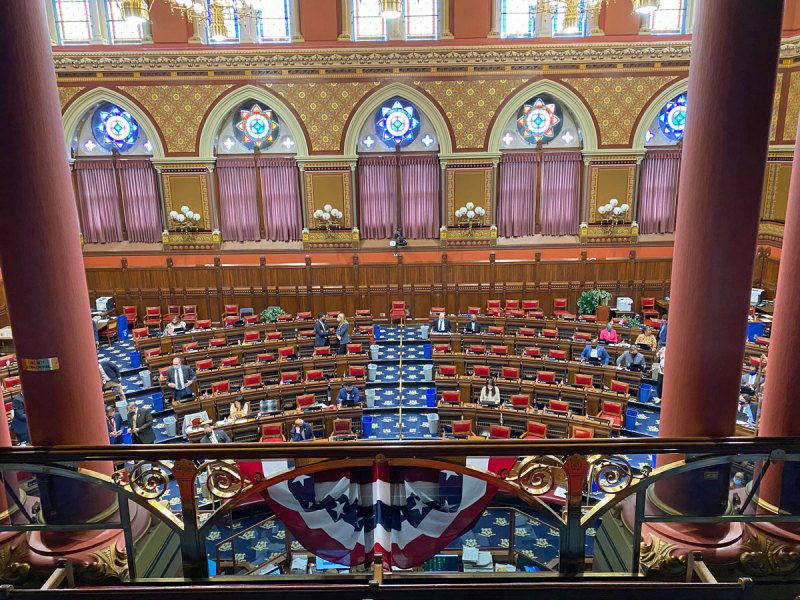Lawmakers Look to Extend Lamont’s Powers Next Week

Audio By Carbonatix

House chamber. Photo courtesy of CTNewsJunkie.com
Gov. Ned Lamont’s emergency declaration, which allows orders such as school mask mandates and vaccination mandates to be in effect, is set to expire on Sept. 30 unless extended by the legislature.
By Hugh McQuaid, CTNewsJunkie.com
The legislature will meet for two days early next week to debate extending Gov. Ned Lamont’s pandemic-related emergency declarations which are currently scheduled to expire next Thursday.
Lawmakers in the House will convene Monday for a special session to approve the extension and the Senate will follow suit on Tuesday. The governor has maintained a level of emergency authority since the outset of the COVID-19 pandemic last March and the legislature is expected to continue those declarations until after they reconvene for a regular session next February.
The ongoing emergency declarations give Lamont the authority to continue executive orders like those requiring masks be worn in Connecticut schools as well as mandates that some workers be vaccinated against the coronavirus or consent to weekly COVID testing. But a law passed this summer gives a group of six legislative leaders the ability to reject the governor’s orders if they are so inclined.
In July, the last time Connecticut’s emergency declarations were set to expire, Lamont sent legislative leaders a five-page letter detailing his rationale for extending the emergency and explaining which orders he intended to continue. The administration expects to provide legislators with a similar letter later this week.
However, last week Lamont said he planned to continue orders requiring vaccination or weekly testing for state employees, school workers, and others as well as an order mandating masks in schools.
“We need an extension of the emergency orders cause that allows me to put in place executive orders which we need to keep you safe,” Lamont said last week.
The governor also suggested the emergency declarations would help the state manage evolving efforts to vaccinate residents against the virus. Specifically, he has pointed to the possible rollout of the vaccine for children younger than 12 if they become eligible as well as booster shots for more residents if they are approved.
Both issues remain in flux. Last week a Food and Drug Administration advisory panel recommended additional doses of the vaccine for high-risk individuals and people older than 65 but declined to make the same recommendation for the rest of the population. Meanwhile, Pfizer announced Monday that a key trial had shown their vaccine to work in children as young as five and the pharmaceutical company planned to seek FDA approval for the 5- to 11-year-old age group.
“The Pfizer development is significant, especially for parents of young children,” Max Reiss, the governor’s chief spokesman, said Monday. “We are monitoring the developments as they relate to the potential for an emergency use authorization and will work with providers to ensure wide availability of the vaccine.”
Democratic leaders, who have strong majorities in both chambers of the legislature, have said they are inclined to grant the emergency extension, depending on what the governor plans to do with it. They have pointed in recent weeks to Connecticut’s COVID numbers which have remained elevated as the more transmissible delta variant has fueled a surge in cases across the nation.
Connecticut’s metrics have fluctuated over the past week or so, and as of Monday, there were 309 COVID patients in hospitals around the state. While that represents a decrease of 23 over the weekend, when lawmakers last voted to continue the declaration in July, there were only 38.
Republicans have argued that the pandemic can be managed without an ongoing declaration.
On Monday, House Minority Leader Vincent Candelora pointed to Massachusetts, a state with a Republican governor and a Democratic-controlled legislature. Masks are required in Massachusetts schools, but the order stems from the state’s education commissioner rather than its governor.
Candelora said he didn’t know if his caucus would support a similar arrangement, but said they were not interested in continuing the governor’s “carte blanche” emergency authority. Although Lamont has maintained only around a dozen orders under the declarations, Candelora said the legislature had given him broad powers.
“The executive orders may be limited but the authority he’s being given is not. That’s the rub. If the powers were limited to the administration of vaccines and to managing the disease of COVID, there would be a different conversation but we’re not having that conversation,” Candelora said.
Last week, the governor told reporters he welcomed the legislature’s scrutiny of his pandemic orders and some lawmakers maintain the recently-passed statute giving leaders the ability to revoke Lamont’s executive orders amount to an additional check on his executive powers.
“We certainly have more legislative oversight in place now because of that statute,” Senate President Martin Looney said last week.
As of Aug. 26, Connecticut was one of 27 states with some type of active emergency declaration related to the COVID-19 pandemic, according to the National Academy for State Health Policy. However, Connecticut and Rhode Island are the exceptions in New England, where the rest of the states in the region no longer have emergency declarations in place.
Republished with permission from CTNewsJunkie.com, all rights reserved.
Like what you see here? Click here to subscribe to We-Ha’s newsletter so you’ll always be in the know about what’s happening in West Hartford! Click the blue button below to become a supporter of We-Ha.com and our efforts to continue producing quality journalism.



